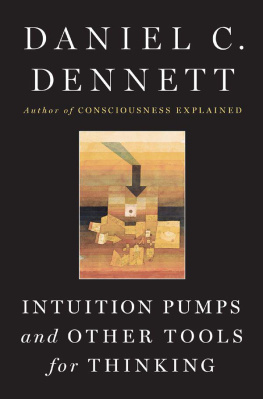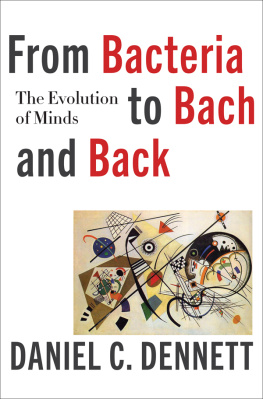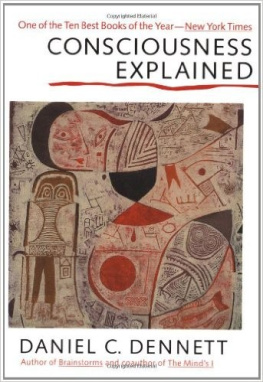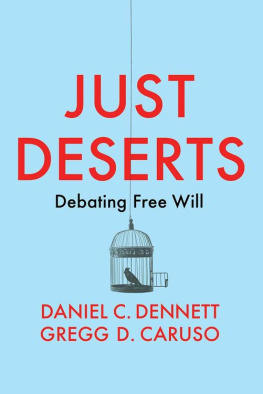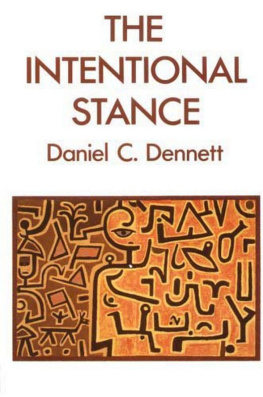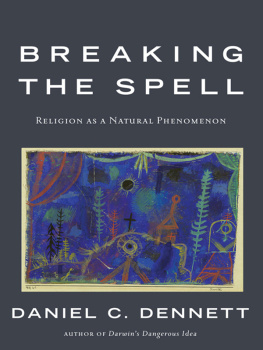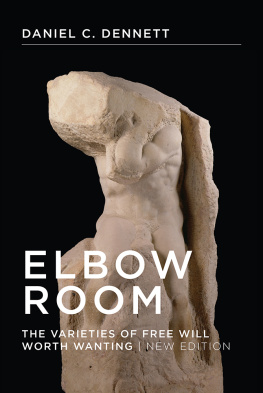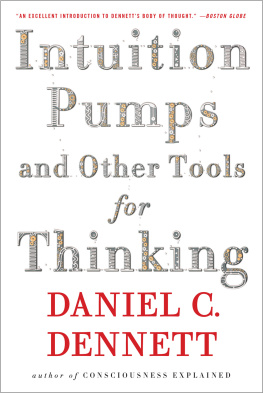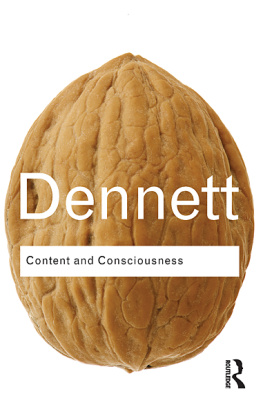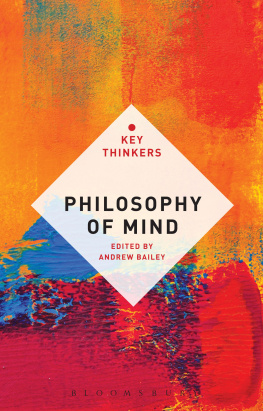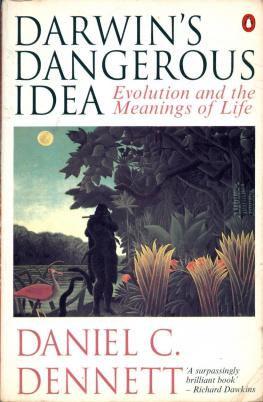I NTUITION P UMPS
AND OTHER
TOOLS FOR THINKING
D ANIEL C. D ENNETT

F OR T UFTS U NIVERSITY, MY ACADEMIC HOME
CONTENTS
Tufts University has been my academic home for more than forty years, and for me it has always seemed to be just right, like Goldilockss porridge: not too burdened, not too pampered, brilliant colleagues to learn from with a minimum of academic prima donnas, good students serious enough to deserve attention without thinking they are entitled to round-the-clock maintenance, an ivory tower with a deep commitment to solving problems in the real world. Since creating the Center for Cognitive Studies in 1986, Tufts has supported my research, largely sparing me the ordeals and obligations of grantsmanship, and given me remarkable freedom to work with folks in many fields, either traveling afar to workshops, labs, and conferences or bringing visiting scholars and others to the Center. This book shows what Ive been up to all these years.
In the spring of 2012, I test-flew a first draft of the chapters in a seminar I offered in the Tufts Philosophy Department. That has been my custom for years, but this time I wanted the students to help me make the book as accessible to the uninitiated as possible, so I excluded graduate students and philosophy majors and limited the class to just a dozen intrepid freshmen, the first twelveactually thirteen, due to a clerical fumblewho volunteered. We led each other on a rollicking trip through the topics, as they learned that they really could stand up to the professor, and I learned that I really could reach back farther and explain it all better. So heres to my young collaborators, with thanks for their courage, imagination, energy, and enthusiasm: Tom Addison, Nick Boswell, Tony Cannistra, Brendan Fleig-Goldstein, Claire Hirschberg, Caleb Malchik, Carter Palmer, Amar Patel, Kumar Ramanathan, Ariel Rascoe, Nikolai Renedo, Mikko Silliman, and Eric Tondreau.
The second draft that emerged from that seminar was then read by my dear friends Bo Dahlbom, Sue Stafford, and Dale Peterson, who provided me with still further usefully candid appraisals and suggestions, most of which I have followed, and by my editor, Drake McFeely, ably assisted by Brendan Curry, at W. W. Norton, who are also responsible for many improvements, for which I am grateful. Special thanks to Teresa Salvato, program coordinator at the Center for Cognitive Studies, who contributed directly to the entire project in innumerable ways and helped indirectly by managing the Center and my travels so effectively that I could devote more time and energy to making and using my thinking tools.
Finally, as always, thanks and love to my wife, Susan. Weve been a team for fifty years, and she is as responsible as I am for what we, together, have done.
DANIEL C. DENNETT
Blue Hill, Maine
August 2012
I NTUITION P UMPS
AND OTHER
TOOLS FOR THINKING
You cant do much carpentry with your bare hands and you cant do much thinking with your bare brain.
B O D AHLBOM
T hinking is hard. Thinking about some problems is so hard it can make your head ache just thinking about thinking about them. My colleague the neuropsychologist Marcel Kinsbourne suggests that whenever we find thinking hard, it is because the stony path to truth is competing with seductive, easier paths that turn out to be dead ends. Most of the effort in thinking is a matter of resisting these temptations. We keep getting waylaid and have to steel ourselves for the task at hand. Ugh .
There is a famous story about John von Neumann, the mathematician and physicist who turned Alan Turings idea (what we now call a Turing machine) into an actual electronic computer (what we now call a Von Neumann machine, such as your laptop or smart phone). Von Neumann was a virtuoso thinker, legendary for his lightning capacity for doing prodigious calculations in his head. According to the storyand like most famous stories, this one has many versionsa colleague approached him one day with a puzzle that had two paths to a solution, a laborious, complicated calculation and an elegant, Aha! -type solution. This colleague had a theory: in such a case, mathematicians work out the laborious solution while the (lazier, but smarter) physicists pause and find the quick-and-easy solution. Which solution would von Neumann find? You know the sort of puzzle: Two trains, 100 miles apart, are approaching each other on the same track, one going 30 miles per hour, the other going 20 miles per hour. A bird flying 120 miles per hour starts at train A (when they are 100 miles apart), flies to train B, turns around and flies back to the approaching train A, and so forth, until the two trains collide. How far has the bird flown when the collision occurs? Two hundred and forty miles, von Neumann answered almost instantly. Darn, replied his colleague, I predicted youd do it the hard way, summing the infinite series. Ay! von Neumann cried in embarrassment, smiting his forehead. Theres an easy way! (Hint: How long until the trains collide?)
Some people, like von Neumann, are such natural geniuses that they can breeze through the toughest tangles; others are more plodding but are blessed with a heroic supply of willpower that helps them stay the course in their dogged pursuit of truth. Then there are the rest of us, not calculating prodigies and a little bit lazy, but still aspiring to understand whatever confronts us. What can we do? We can use thinking tools, by the dozens. These handy prosthetic imagination-extenders and focus-holders permit us to think reliably and even gracefully about really hard questions. This book is a collection of my favorite thinking tools. I will not just describe them; I intend to use them to move your mind gently through uncomfortable territory all the way to a quite radical vision of meaning, mind, and free will. We will begin with some tools that are simple and general, having applications to all sorts of topics. Some of these are familiar, but others have not been much noticed or discussed. Then I will introduce you to some tools that are for very special purposes indeed, designed to explode one specific seductive idea or another, clearing a way out of a deep rut that still traps and flummoxes experts. We will also encounter and dismantle a variety of bad thinking tools, misbegotten persuasion-devices that can lead you astray if you arent careful. Whether or not you arrive comfortably at my proposed destinationand decide to stay there with methe journey will equip you with new ways of thinking about the topics, and thinking about thinking.
The physicist Richard Feynman was perhaps an even more legendary genius than von Neumann, and he was certainly endowed with a world-class brainbut he also loved having fun, and we can all be grateful that he particularly enjoyed revealing the tricks of the trade he used to make life easier for himself. No matter how smart you are, youre smarter if you take the easy ways when they are available. His autobiographical books, Surely Youre Joking, Mr. Feynman! and What Do You Care What Other People Think?, should be on the required reading list of every aspiring thinker, since they have many hints about how to tame the toughest problemsand even how to dazzle an audience with fakery when nothing better comes to mind. Inspired by the wealth of useful observations in his books, and his candor in revealing how his mind worked, I decided to try my own hand at a similar project, less autobiographical and with the ambitious goal of persuading you to think about these topics my way. I will go to considerable lengths to cajole you out of some of your firmly held convictions, but with nothing up my sleeve. One of my main goals is to reveal along the way just what I am doing and why.
Next page
